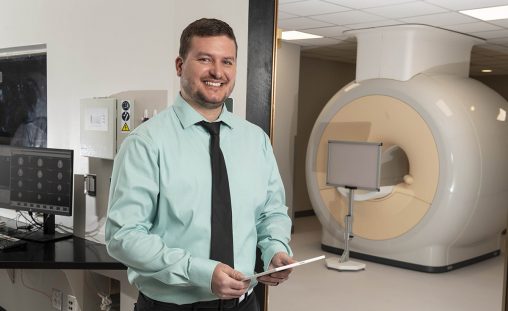
Matthew Sherwood, research associate professor and director of the Center of Neuroimaging and Neuro-Evaluation of Cognitive Technologies at Wright State, was named to the Dayton Business Journal’s Forty Under 40 list for 2023.
Eight people with Wright State University connections, including Matt Sherwood, Ph.D., research associate professor, were named to Dayton Business Journal’s Forty Under 40 list for 2023.
This marks the 26th year the Dayton Business Journal has honored the region’s brightest young professionals. More than 200 people from around the Miami Valley were nominated this year.
An awards banquet for the winners will be held May 18 at Wright State University’s Dunbar Library from 5:30 to 7:30 p.m.
Sherwood, who has been with Wright State since 2012, is also a four-time graduate, receiving a bachelor’s degree, master’s degree and a Ph.D. in biomedical engineering and a Master of Business Administration.
He currently serves as research associate professor and director of the Center of Neuroimaging and Neuro-Evaluation of Cognitive Technologies.
One of Sherwood’s most notable achievements was helping to secure a Department of Defense grant that supported the purchase and installation of a state-of-the-art 3 Tesla MRI scanner in Wright State’s Neuroscience Engineering Collaboration Business. This is marked as the first MRI in the Dayton region dedicated to research and one of the few MRI sites solely dedicated to research in the U.S.
The program served to further Wright State’s collaboration with the Department of Defense and helped the university to become a leader in neuroscience research.
Some of Sherwood’s research includes a Defense Department-funded project that used MRI technology to develop brain training exercises to combat tinnitus, or constant ringing in the ears.
“We provided visualizations of brain activity to the subjects in real-time and asked them to manipulate the brain activity signals that we were measuring,” he said. “Our goal was to drive hyperactivity in certain areas of the brain down, to lessen the ringing, helping them to regain some of their attention and awareness, and allow them to divert their attention to other things.”
He said the ultimate goal of this research was to use the information they gained in the MRI to develop noninvasive and non-pharmacological applications, like those on a phone, that can help provide the same brain training.
Brain training can also be applied in many other areas, such as the treatment of ADHD, depression and cognitive decline. The benefits of this treatment include fewer side effects and long-term negative impacts on the body such as organ damage or addiction.
Sherwood has led other Defense Department projects that have evaluated electrical brain stimulation techniques for their ability to enhance learning and cognitive function and to assess the neural underpinnings of these technologies. He holds a patent based on this work. Additional projects he has led have evaluated the neurophysiological effects of hypoxia, decreased oxygen to the brain. He is continuing to work in these areas.
Wright State alumni named to the Forty Under 40 list:
Marita Abram, associate professor, biological sciences, Sinclair Community College
Master’s degree in biological sciences, 2014
Lauren Coyle, administrator, Bethany Village
Bachelor’s degree in biological sciences, 2016
Laura Henry, director of marketing and public outreach, Miami Valley Regional Planning Commission
Bachelor’s degree in management, 2007
Erin Holden, division and program manager, Parallax Advanced Research
Bachelor’s degree in organizational leadership, 2017
Zachary Kiehl, CEO and co-founder, Sentinel Occupational Safety Inc.
Bachelor’s degree in biomedical engineering, 2014; master’s degree in biomedical engineering, 2015
Ryan Konkel, system EMS coordinator, Kettering Health
Bachelor’s degree in organizational leadership, 2007
Ashley Prichard, office manager, Waibel Energy Systems

 Wright State psychology team studies ways to identify fatigue in pilots, drivers
Wright State psychology team studies ways to identify fatigue in pilots, drivers  Wright State videographer Kris Sproles wins Regional Emmy and Ohio journalism award
Wright State videographer Kris Sproles wins Regional Emmy and Ohio journalism award  Wright State Boonshoft School of Medicine ranked among the nation’s best for 2024 by U.S. News
Wright State Boonshoft School of Medicine ranked among the nation’s best for 2024 by U.S. News  Exposing biotechnology
Exposing biotechnology  Wright State faculty member Dan Noel uses unique background to inspire new leaders
Wright State faculty member Dan Noel uses unique background to inspire new leaders 